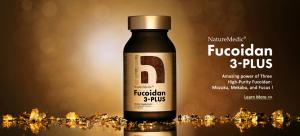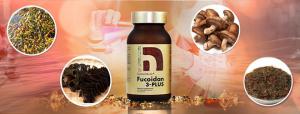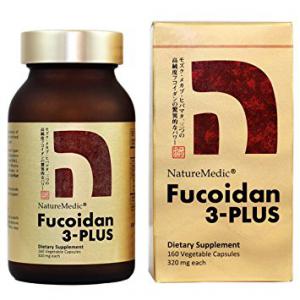Fucoidan (Mozuku, Mekabu & Fucus) may help prevent women from human papillomavirus (HPV) by Dr. Susana Trujillo
Human papillomavirus (HPV) is the most common sexually transmitted infection in the United States. Approximately 85% of sexually active women.
It is important to focus the attention on the innate immune system, to protect the immune system.”
NEW YORK, NY, UNITED STATES, December 4, 2018 /EINPresswire.com/ -- Human papillomavirus (HPV) is the most common sexually transmitted infection in the United States. Approximately 85% of sexually active women and 91% of sexually active men will be infected with HPV in their lifetime. Approximately half of new infections occur among individuals aged 15–24 years.1 Though genital skin contact is the primary mode of transmission, the infection does not require sexual penetration. The most common symptom of HPV infection is genital warts, although many infected people are asymptomatic, and the virus often resolves on its own. Physicians diagnosed over 400,000 cases of genital warts in 2013. However, the most serious consequence of HPV infection is cancer.2— Dr. Susana Trujillo
HPV infection is known to cause cervical, vulvar, and vaginal cancer in women. It is also an attributable cause of anal and oropharyngeal cancer. Between 1993 and 2005, HPV was linked to 90.6% of all cervical cancer cases, 70.1% of oropharyngeal cancers, and 91.1% of anal cancers in the United States.4
HPV-related cancers affect women in the United States. There are 17,600 women affected by HPV-related cancers annually; of those, approximately 11,000 women are diagnosed with cervical cancer. Women also have a higher prevalence of anal cancer than men.3,4 Among women, the incidence of cervical cancer affects African Americans and Hispanics, who are more likely to be diagnosed with cervical cancer and have higher cervical cancer mortality rates than other ethnic groups. Delayed diagnosis is a major contributor to this difference.
It is important to keep in mind that many during the early stages of human papillomavirus (HPV) infections, the innate immune system creates a pro-inflammatory microenvironment by recruiting innate immune cells to eliminate the infected cells, initiating an effective acquired immune response. However, HPV shows a wide range of strategies for evading immune-surveillance, generating an anti-inflammatory microenvironment.5 Therefore, it is important to focus the attention on the innate immune system, to protect the immune system.
In the past years, scientists have focused their attention on the effectiveness of Fucoidan in preventing HPV. It was been well-researched that some sulfated polysaccharides from brown seaweeds like Fucoidan possess good antiviral and anti-tumor activities and some of them have been developed into novel antiviral ingredients. Fucoidan is a term used to define a family of l-fucose-containing sulfated polysaccharides found in brown seaweeds (Mozuku, Mekabu and Fucus) and the structures of Fucoidan tend vary among species and sometimes among different parts of the brown seaweeds (Mozuku, Mekabu and Fucus). Fucoidan has exhibit important pharmacological activities such as anticoagulant, anti-inflammatory, antiviral and antiproliferative. It was found that Fucoidan showed significant anti-HPV properties. Furthermore, it was reported that Fucoidan obtained from Mozuku, Mekabu and Fucus could also inhibit HPV pesudovirus infection in vitro. The anti-HPV effects of Fucoidan is very good and it will help to further investigate its properties as a novel anti-HPV or anti-cervical cancer candidate in the future. Taken together, Fucoidan from Mozuku, Mekabu and Fucus have good antiviral or anti-tumor activities, thus the sulfated polysaccharides from the brown seaweeds have the potential to become new resources for the development of anti-HPV and related cancer agents.
HPV-caused cancer is a major health problem worldwide, especially in developing countries. The discovery of natural alternatives specifically capable of inhibiting HPV and the cancers related to it is urgently required to prevent HPV infections.6 Brown seaweed compounds especially Fucoidan (Mozuku, Mekabu and Fucus) may effectively block the entry process of HPV. Moreover, the anti-HPV related cancer agents produced by natural compounds often cannot only target against the viral oncogenes but also inhibit the dysregulated gene expression of the host cells. Therefore, natural products derived from brown seaweeds like Fucoidan are excellent sources for the effective prevention of anti-HPV.
In summary, the anti-HPV and anticancer agents derived from brown seaweeds (Fucoidan) have potential to treat both unapparent HPV infection as well as visible clinical diseases. Besides that, Fucoidan offers many advantages, such as relatively low cytotoxicity and additional health benefits, which suggest that Fucoidan may be a great candidate to reduce or regulate or prevent HPV infections.
References:
1. Myers, E.R., McCrory, D.C., Nanda, K., Bastian, L., Matchar, D.B. (2000). Mathematical model for the natural history of human papillomavirus infection and cervical carcinogenesis. Am J Epidemiol; 151:1158–1170.
2. Centers for Disease Control and Prevention. (2017). Genital HPV Infection - Fact Sheet.
3. U.S. Preventive Services Task Force. (2016). Cervical Cancer: Screening (link is external).
4. Centers for Disease Control and Prevention. (2013). Incidence, Prevalence, and Cost of Sexually Transmitted Infections in the United States (PDF, 1.6 MB).
5. Centers for Disease Control and Prevention. (2016). HPV Vaccine – Questions and Answers.
6. Centers for Disease Control and Prevention. (2012). Human papillomavirus-associated cancers—United States, 2004–2008. Morbidity and Mortality Weekly Report; 61(15):258–261.
Dr. Susana Trujillo
Dr. Susana Trujillo
+1 9292154077
email us here
Fucoidan 3-Plus contains high-purity Fucoidan!



